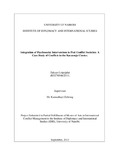| dc.contributor.author | Lolpejalai, Zakayo | |
| dc.date.accessioned | 2013-11-22T05:14:41Z | |
| dc.date.available | 2013-11-22T05:14:41Z | |
| dc.date.issued | 2013-09 | |
| dc.identifier.citation | Master Of Arts In International Conflict Management To The Institute Of Diplomacy And International Studies (idis), University Of Nairobi. | en |
| dc.identifier.uri | http://erepository.uonbi.ac.ke:8080/xmlui/handle/123456789/59797 | |
| dc.description.abstract | The study is set on Post-cold war era where intrastate conflicts have become frequent and protracted over the years. The study draws views from various scholars and experiences from other parts of the world and relates them on the area of study which is the Karamoja cluster. The study takes into account the fact that more players are involved in managing conflicts in the post-cold war era as opposed to the pre-cold war. The expectation would therefore be reduction of destructive armed conflicts and improved social, economic and political setting of states and the communities therein. However, the situation is to the contrary. The study therefore aimed at addressing the missing link taking into consideration the psychosocial interventions in conflict management among the post conflict societies. The objectives of the research is to establish the establish the main causes and effects of intra state armed conflicts, discuss the approaches of conflict management employed by state and non-state actors with particular focus on the Karamoja cluster and to establish the link between protracted conflicts and lack of psychosocial interventions. The research set out to establish the above objectives with the assumption that integrating psychosocial interventions in conflict management strategies brings about sustainable peace. Four components of tools of analysis were adopted in the methodology in the research. Review of secondary data to discuss psychosocial interventions and where they have been applied while comparing the views of various scholars. Secondly, collection of primary data through interviews, focused group discussions and key informant interviews. The methodology adopted aided data triangulation and in depth analysis of the various views presented by the scholars in comparison with the picture depicted in the Karamoja cluster. The main findings of the study indicate that integrating psychosocial interventions in conflict management approaches brings about integration and peaceful co-existence in post conflict societies. The study established that lack of coordination and the reactive nature to conflicts by state and non-state actors has been the trend on the Karamoja cluster. The research therefore advocates coordination and sustained efforts is managing conflicts in post conflict societies in addition to integration of psychosocial interventions by all actors. | en |
| dc.language.iso | en | en |
| dc.title | Integration of psychosocial interventions in post conflict societies: a case study of conflicts in the Karamoja cluster | en |
| dc.type | Thesis | en |
| local.publisher | Institute Of Diplomacy And International Studies, | en |

